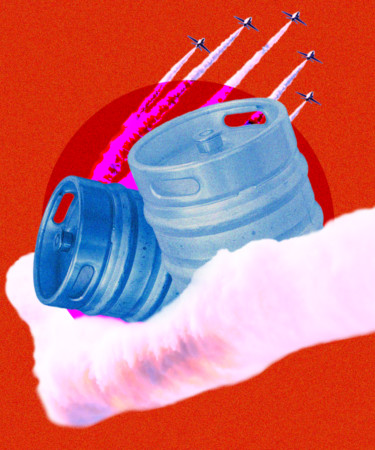There is perhaps no greater disappointment than opening the fridge after a long, hard day and discovering that there is no beer. For British soldiers who fought on a very famous day during World War II, the gloom was felt deeply after the Allied forces stormed Normandy. For despite the fight that would go down in history as D-Day, these heroes wishing to wet their whistles came to realize there was no beer to be found in France.
Prior to D-Day, British breweries had been providing beer to the troops for free, sending barrels on boats through the English Channel. But after June 6, 1944, the ships sailing through the English Channel had no room to carry beer for the soldiers — presumably prioritizing space for weapons, food, and other essential supplies.
According to Martyn Cornell, author of the award-winning beer blog Zythophile, soldiers wrote home and to U.K. newspapers to lament that there was no beer available to them in France. This left them no other option than to drink bitter, watery cider. “I saw a British private wistfully order a pint of mild and bitter: but the glass he sat down with contained the eternal cider,” wrote one soldier, according to Cornell’s “Strange Tales of Ale.” Their cries were heard: The British government responded by making sure shipments included beer within some weeks. But when space was finally made for beer on British ships a month later, there was only enough for one pint per soldier — and presumably, 16 ounces was not nearly enough to satisfy each soldier’s thirst.
Meanwhile, in the weeks in between, savvy mechanics were at work. To show support for the soldiers (and because it was rumored that Nazis were polluting French drinking water), British technicians were determined to find a way to repackage beer to-go to the men in Normandy. If they couldn’t supply the beer by ship, wasn’t there another way?
Just days after D-Day, on June 13, 1944, Royal Air Force (RAF) mechanics modified a 45-liter jettison torpedo tank for use on the Spitfire, a British single-seat fighter aircraft. According to Lieutenant Lloyd Berryman, pilots were instructed to “arrange with the officers’ mess to steam out the jet tanks and load them up with beer. When we get over the beachhead drop out of formation and land on the strip.”
They did just that: Instead of fuel, the mechanics filled the torpedo tanks headed to Normandy with beer. (Cornell stipulates the barrels of beer may have been brewed at the nearby Henty and Constable’s brewery in Chichester.) The largest ale-drop touched down a week after D-Day, when the Spitfire Mk IX (an updated version of the Spitfire) delivered around 270 gallons of beer to the British soldiers in Normandy. The plane’s pylons were used to hold casks of various shapes and sizes. These casks were strapped into what were called “beer-bombs,” a casing including a homemade nose cone that allowed for a more streamlined dropoff.
During flight, records say, pilots aimed to reach high altitudes, where the colder air could chill the ale for the thirsty servicemen. This meant it was ready for immediate consumption upon delivery — a vital detail for the ever-so-patient heroes who desperately craved a drink.
Today, knowing that fresh beer is only a few steps or smartphone taps away, we raise our glasses to those thirsty soldiers — and to the brilliant technicians who let nothing get between a solider and his beer.
